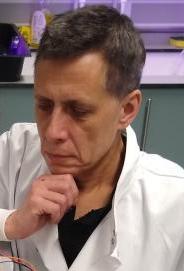


Call for Participation
The Technical Committee on Multiple-Valued Logic of the IEEE Computer Society will hold its 51st annual symposium (ISMVL 2021) in fully online, from May 25 to 27, 2021. ISMVL 2021 offers you a great opportunity to follow the recent technologies and explore future directions in multiple-valued logic and its related areas.
The following invited speakers will present their cutting-edge research results:
 Prof. Andrew Adamatzky (University of the West of England Bristol, United Kingdom) Title: Unconventional Computing Abstract: The unconventional computing is a niche for interdisciplinary science, cross-bred of computer science, physics, mathematics, chemistry, electronic engineering, biology, material science and nanotechnology. It aims to uncover and exploit principles and mechanisms of information processing in and functional properties of physical, chemical and living systems to develop efficient algorithms, design optimal architectures and manufacture working prototypes of future and emergent computing devices. The recent advances in the field are too vast to even list in one talk, so I will focus on my personal achievements in the field. I will demonstrate computer modelled and experimental laboratory prototypes of computing and sensing devices implemented with cytoskeleton polymers living plants, fungi and slime mould. Three families of unconventional computing/sensing devices will be considered: spiking of voltage, morphological and collision-based. In computational devices based on spiking activity, data are represented by electrical impulses injected in the a system from input electrodes and results are interpreted as combinations of spikes on the output electrodes. In the morphological computers data are presented by configurations of attractants and repellents and results are given by a physical reconfiguration of the living substrate (protoplasmic network, roots, mycelium). In the collision-based computers data are presented by physical and chemical stimuli of the substrate, computation is implemented by spikes of electrical activity propagating in the substrate and results of the computation are recorded as spiking activity in dedicated parts of the substrate. |
|
Prof. Nobuyuki Matsuda (Tohoku University, Japan) Title: Quantum Information Processing Using Integrated Photonics Abstract: Smallness, stability, tuneability and large optical nonlinearity of on-chip photonics devices have proven useful for quantum information processing experiments using photons. In this talk, we review our silicon- and silica-based waveguide devices for the generation and manipulation of quantum states of light on a chip as well as their applications. |
 Prof. Libor Barto (Charles University, Czech Republic) Title: Minimal Taylor Clones Abstract: Clones, i.e., sets of multivariate functions on a common domain that are closed under forming term operations, govern the computational complexity of broad classes of computational problems, including the fixed template constraint satisfaction problems (CSPs). To each such a CSP one assigns a certain clone (which consists of those functions that preserve constraint relations) and then the "larger" is the associated clone, the "easier" is the CSP. As conjectured by Bulatov, Jeavons, and Krokhin (2005), and confirmed Independently by Bulatov and Zhuk (2017), a CSP is solvable in polynomial time if the associated clone is Taylor, and is NP-complete otherwise. In a joint work with Brady, Bulatov, Kozik, and Zhuk we initiated a systematic study of minimal Taylor clones, i.e., clones that correspond to the "hardest" polynomial-time solvable CSPs. The aim of the talk is to explain some of the motivations and selected results of this work. |
Technical (Regular) Papers:
Other than the invited talks, 34 high-quality technical papers including special sessions will be presented as well. The tentative program will be available here.
In conjunction with ISMVL 2021, the following PhD forum and workshops will be held.
- ACeSYRI PhD Forum (May 24, 2021)
- 30th International Workshop on Post-Binary ULSI Systems (May 28, 2021)
- Reed-Muller 2021 Workshop (May 28, 2021)
All participants are required to register. The deadline for early registration is April 23, 2021. Details about registration such as registration fee and how to register are available here.
| Symposium Chair: | Program Chair: |
|
Prof. Martin Lukac Nazarbayev University, Kazakhstan Email: martin.lukac{at}nu.edu.kz |
Prof. Shinobu Nagayama Hiroshima Ciry University, Japan Email: s_naga{at}hiroshima-cu.ac.jp |


